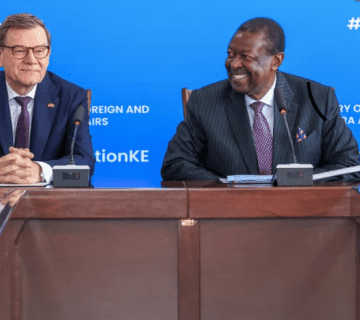In an era marked by intensifying climate disasters, melting polar ice caps, and rising global temperatures, international cooperation has never been more critical. The Paris Agreement, adopted in 2015, was a historic moment in the global fight against climate change, uniting nations around a shared commitment to keep global warming to well below 2°C, ideally 1.5°C. Among its signatories, the United States of America (US) played a pivotal role, not only as one of the world’s largest greenhouse gas emitters but also as a key driver of climate finance and technological innovation.
Yet in a dramatic reversal of climate diplomacy, the United States has once again withdrawn from the Paris Agreement in 2025, marking its second exit in less than a decade. This decision was driven largely by domestic political and economic considerations. Heightened partisan polarization in the US made climate policy a contentious issue, with the conservative or Republican leadership portraying the agreement as a threat to national sovereignty and economic growth. Fossil fuel industry interests, which have regained influence in the second term of President Donald Trump (2025-2028), have pushed for deregulation and framed international commitments as damaging to American jobs and economic competitiveness. Additionally, the U.S. federal system complicated a unified climate action, as state-level approaches remained divided. Some policymakers also criticized the Paris Agreement as unfair, arguing that it imposed greater responsibilities on the U.S. while allowing emerging economies more flexibility. These factors combined to produce a withdrawal that reflected deep-rooted national debates over environmental policy, economic priorities, and international cooperation. While the U.S. asserts the move is necessary to safeguard national interests and economic competitiveness, the implications of this retreat are far-reaching and potentially destabilizing.
This development occurred against the backdrop of a worrying global trend: widespread failure to meet the Paris Agreement’s deadlines for updated Nationally Determined Contributions (NDCs)- the core mechanism by which countries outline their climate ambitions every five years. Only 15 of the 194 signatories met the latest deadline, including neither China, India, nor Russia. This lack of compliance among the world’s major polluters indicates a wider breakdown of the cooperative spirit that once defined climate governance.
The Role of the United States in Global Climate Governance
The United States has long been a cornerstone of the global climate regime. Being the second-largest producer of greenhouse gases in the world and a significant industrial power, its actions—or lack thereof—have a disproportionate impact on the course of the global climate. Since the 1992 Rio Earth Summit and the subsequent adoption of the United Nations Framework Convention on Climate Change (UNFCCC), the U.S. has oscillated between leadership and withdrawal, reflecting deep domestic divides on climate policy.
Under the Obama administration, the U.S. played a key diplomatic role in shaping the Paris Agreement, pledging bold emission cuts and contributing billions of dollars to the Green Climate Fund to help developing countries adapt to climate impacts. Its re-entry into the Agreement in 2021, under President Biden, was widely seen as a symbolic and strategic recommitment to multilateralism.
However, the 2025 withdrawal signals a sharp reversal. The United States is once again abdicating its moral and political responsibility at a time when coordinated global action is most urgent. The retreat not only jeopardizes the collective ambition of the Paris framework but also erodes trust in the consistency of American foreign policy, particularly among climate vulnerable countries that depend on external support.
Furthermore, the U.S. domestic emissions policies have a ripple effect internationally. When the federal government weakens environmental regulations, it not only slows national progress but also gives cover to other major emitters to relax their commitments. Without the political and financial muscle of the U.S., the collective momentum to “ratchet up” ambition has faltered, threatening to lock the world into a trajectory of catastrophic warming.
Global Implications of the U.S. Withdrawal
The U.S. withdrawal from the Paris Agreement carries far-reaching implications that go well beyond symbolic disengagement. It not only undermines collective climate action but also threatens to erode the cooperative foundation essential to the Paris framework. At a time when coordinated global leadership is crucial, the U.S. exit signals a retreat from multilateralism in the face of a climate emergency.
This move represents a deeper erosion of trust in international institutions. The Paris Agreement relies on voluntary commitments, diplomatic goodwill, and shared norms rather than enforcement mechanisms. When a major emitter like the U.S. opts out, it damages the credibility of the entire framework. For developing nations, already bearing the brunt of climate change, the withdrawal is seen as a betrayal of climate justice and shared responsibility, increasing disengagement and skepticism toward the process.
Moreover, the global climate agenda is increasingly shaped by strategic interests tied to the green energy transition. The failure of key emitters to update their Nationally Determined Contributions (NDCs) signals not just waning ambition but a shift toward climate realpolitik. Many countries are now focused on securing critical minerals like lithium and cobalt, resources vital for renewable technologies, fueling a geopolitical scramble. With the U.S. absent, this shift gives more space to emerging powers like China and India to expand influence in these resource-rich regions, weakening prospects for cooperation.
Financially, the implications are just as severe. The U.S. has historically been a key contributor to climate finance mechanisms like the Green Climate Fund, which supports vulnerable countries in mitigation and adaptation. Its withdrawal disrupts funding flows, undermines resilience-building, and may trigger a domino effect of reduced financial commitments by other nations. For frontline states already facing climate disasters, the loss of funding stalls critical projects and exacerbates global inequality.
Ultimately, the U.S. exit affects not just emissions targets but global trust, leadership, and equity in the climate fight. It leaves a leadership vacuum, weakens climate diplomacy, and threatens the resources needed to ensure a fair and effective global response to an escalating crisis.
Way forward
To address the growing fragility of global climate cooperation, the future of climate governance must evolve to embrace new pathways for leadership, resilience, and accountability. One promising direction is the formal recognition and integration of regional and non-state actors into international climate frameworks. Cities, states, corporations, and civil society groups can play a crucial role in sustaining climate action even when national policies shift. Strengthening these decentralized networks will enhance climate resilience and foster innovation from the ground up.
At the same time, future climate agreements must move beyond voluntary pledges and introduce mechanisms that incentivize compliance. This may include incorporating enforcement clauses tied to trade and financial systems, embedding climate objectives into broader economic treaties.
In summary, the U.S. withdrawal from the Paris Agreement underscores significant challenges in global climate governance. With traditional models of voluntary commitment now under scrutiny, the evolving landscape calls for diversified leadership and new mechanisms that better align economic interests with climate objectives.
Raissa Umunyana is a Research Intern at the Horn Institute



